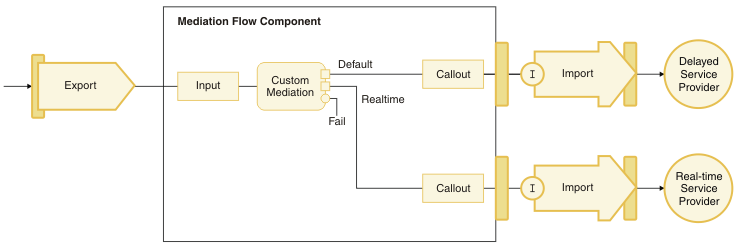IBM BPM, V8.0.1, All platforms > Programming IBM BPM > Enterprise Service Bus programming > Routing Messages Within a Mediation Flow
Example scenarios
This section describes example scenarios that a fictitious company want to implement. It then goes on to discuss the different mediation primitive options that can be used in the implementation.
The scenario addresses the business need of a financial services company that provides an interactive web-based stock market service to its customers.
The company wants to differentiate itself from its competition by offering tiered levels of service. The company's goal is to offer delayed stock quotes to their standard customers and real-time quotes to their gold customers, that is, customers who pay a fee.
The service requester provides a query containing a stock symbol and customer ID to the mediation primitive, which processes the query. The customer's subscription level is determined, and depending on the level of subscription, the query is routed to the appropriate service provider. The quote that is returned from the service provider is then returned to the client application. The following areas look at the ways in which the query can be processed by different mediation primitives.
Message filter mediation primitive
To facilitate the basic request, the company can use the Message Filter mediation primitive within their mediation flow component to selectively route messages that meet a certain criteria, through different paths of a flow, using XPath expressions.
Figure 1. Message filter mediation primitive

Figure 1.shows how the gold output, is associated with the real-time service provider, to offer real-time stock quotes to all gold customers. The default output wire is associated with the delayed service provider, to give delayed stock quotes to all standard customers. The contents of the input message are compared with each XPath expression in turn, and depending on which condition is met, a message can be sent from the associated output terminal.
<body> <getStockQuote> <companyID>IBM</companyID> <customerType>GOLD</customerType> <person xsi:type="Customer"> <customerID>013652</customerID> <customerName>Joe Bloggs</customerName> <customerAddress>123 One Street</customerAddress> </person> </getStockQuote> </body>
The previous input message is received by the Message Filter mediation primitive. The following XPath expression is used to signal that the message is sent from the gold output wire:
/body/getStockQuote/customerType=='GOLD'
If this condition is not met, a message is sent from the default terminal.
Type Filter mediation primitive
The company want to extend the functionality of their mediation flow component, by giving employees the same real-time quotes that the gold customers receive.
To facilitate this request, the company use the Type Filter mediation primitive within their mediation flow component. The primitive uses XPath expressions that can route messages down different paths of a flow, based on their business object type. The Type Filter mediation primitive always sends a message from the first matching output terminal.
Figure 2. Type Filter mediation primitive

Figure 2.shows that the message that is sent from the Message Filter default output wire to the Type Filter mediation primitive. If the business object of type employee is found; the message is sent along the employee output wire to the real-time service provider. For any other business object the message is sent along the default output wire to the delayed service provider.
<body> <getStockQuote> <companyID>IBM</companyID> <customerType>STANDARD</customerType> <person xsi:type="Employee"> <employeeID>013690</employeeID> <employeeName>Jack Bloggs</employeeName> <employeeAddress>123 Two Street</employeeAddress> </person> </getStockQuote> </body>
The previous input message is received by the Type Filter mediation primitive. The following XPath expression and business object type are used to signal that the message is sent from the employee output wire:
XPath: /body/getStockQuote/person Business object type: Employee
Flow Order mediation primitive
The company must log all requests that go to the real-time stock service provider.
To facilitate this request the company use the Flow Order mediation primitive. With this primitive, the company can order the output of the messages.
Figure 3. Flow Order mediation primitive

The log must be carried out before the messages are sent to the real-time service provider through the callout. The log service is a one-way operation. Figure 3.shows that the message that is output from both the Message Filter and the Type Filter mediation primitives is sent to the Flow Order mediation primitive. The output that is sent includes information of all gold member customers and employees that have requested real-time stock quotes. This mediation primitive will send a message to the Service Invoke Log, before sending a message to the callout.
Custom mediation primitive
The company have introduced a silver level of subscription. Silver members will receive real-time stock quotes between the hours of 9:00am and 12:00pm. Outside these hours, silver members receive delayed stock quotes.
Figure 4. Custom mediation primitive
 custom mediation primitive, a delayed service provider and a real-time service provider" />
custom mediation primitive, a delayed service provider and a real-time service provider" />
The enhanced logic to provide time dependent selection of the service is not possible with the Message Filter or Type Filter mediation primitives. In this case, a Custom mediation primitive is used to provide more flexibility. Using a Custom mediation, the entire message can be accessed using a Javaâ„¢ API. Logical expressions can be created using Java. The following Java code shows how the Custom mediation is created:
String customerType = smo.getString("/body/getStockQuote/customerType");
if(customerType.equals("GOLD") || (customerType.equals("SILVER") &&
Calendar.getInstance().get(Calendar.HOUR_OF_DAY)<12 &&
Calendar.getInstance().get(Calendar.HOUR_OF_DAY)>8))
{
// Fire realtime service output service realTimeTerminal.fire(smo);
} else
{
delayedTerminal.fire(smo);
}
Routing Messages Within a Mediation Flow